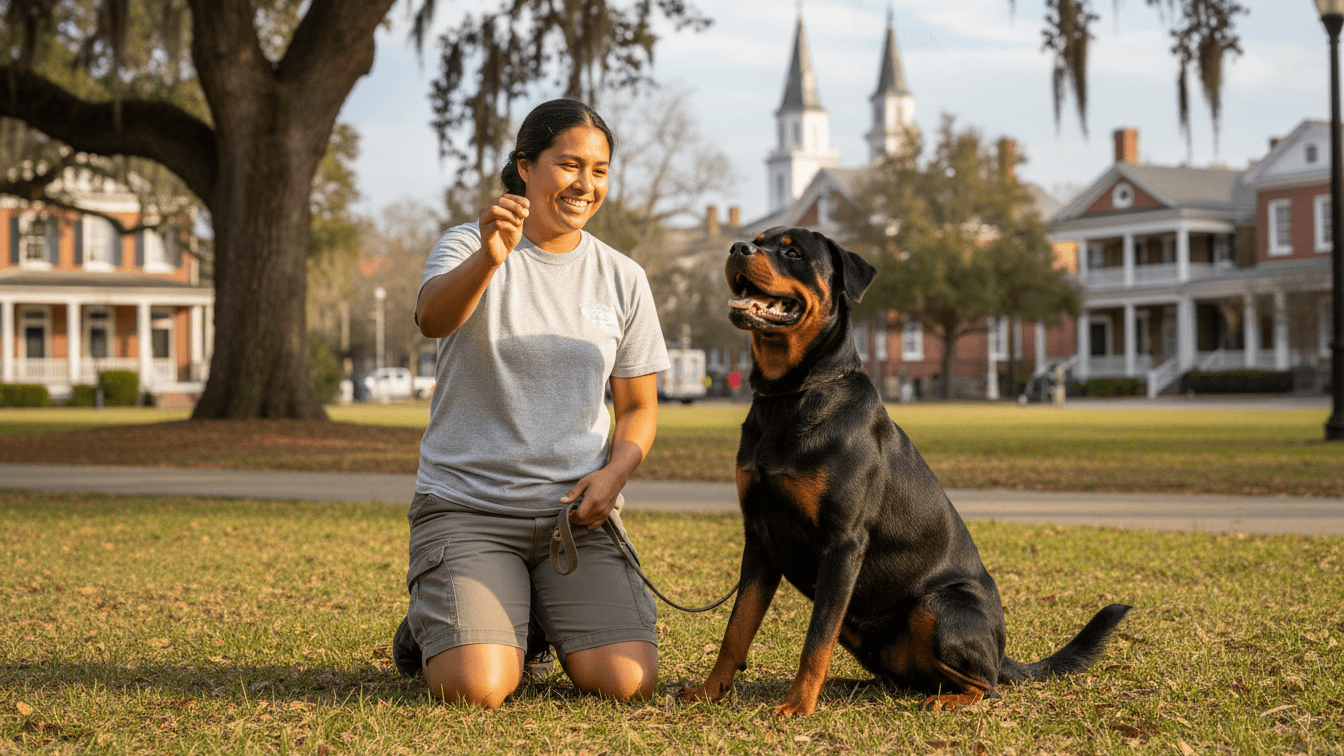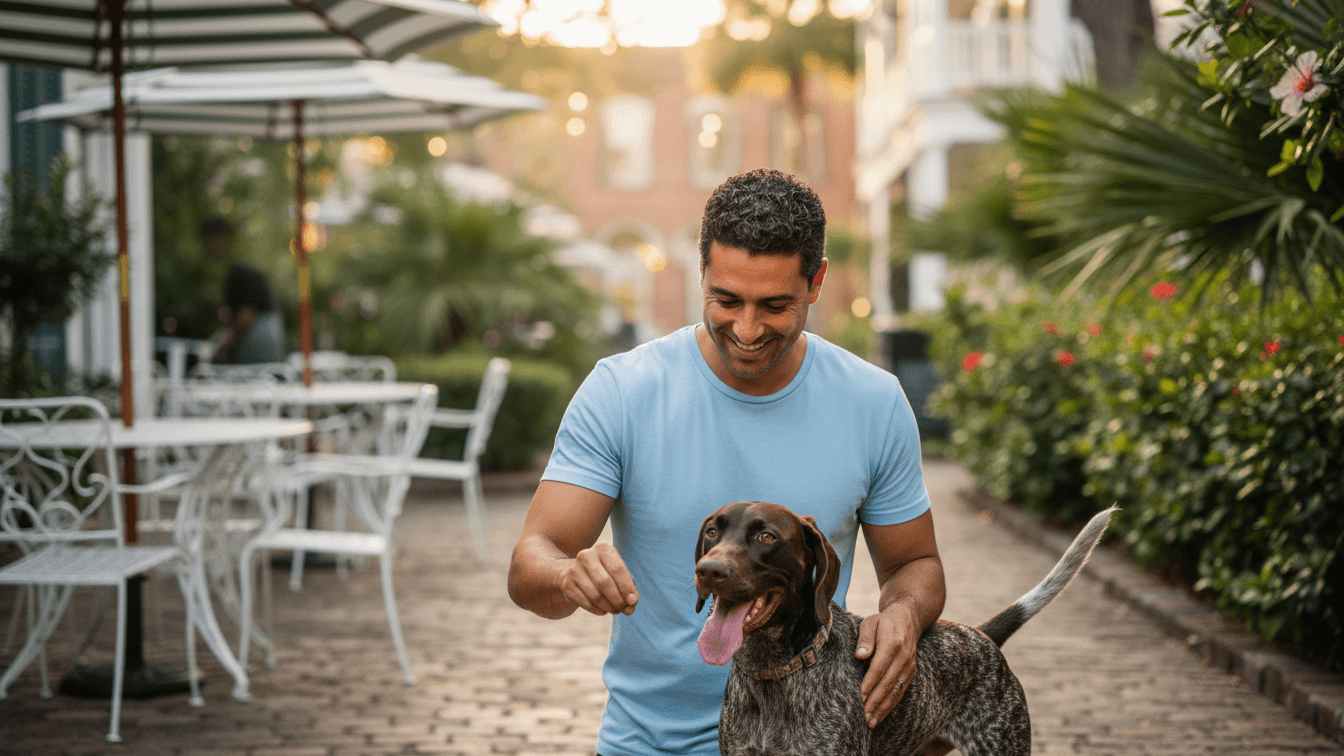Your Complete Guide to Choosing a Dog Trainer in South Carolina and Surrounding Areas
South Carolina offers dog owners a rich mix of coastal towns, bustling cities, and rural communities where dogs need to handle everything from crowded farmers markets to sandy beaches and warm evening strolls through historic districts. Whether you live in Charleston, Columbia, Greenville, or one of the many smaller towns across the state, finding the right professional dog trainer means looking for someone who understands South Carolina’s unique environment and lifestyle.
Your dog will encounter palmetto bugs, boat docks, summer heat, afternoon thunderstorms, and plenty of wildlife. A good training program prepares your dog for real-world situations, from polite behavior at outdoor restaurants to staying calm when a flock of egrets takes flight near the marsh.
How to Choose the Right Trainer
Start by looking for a trainer who uses positive reinforcement training methods and can tailor sessions to your South Carolina lifestyle. Your dog should learn to walk calmly past joggers on the Swamp Rabbit Trail, ignore squirrels in Hampton Park, or stay focused during a busy Saturday at Shem Creek.
Credentials help you compare trainers quickly. Look for dog trainer certifications like CPDT-KA, KPA-CTP, or IAABC-CDBC for behavior problems. If your dog shows serious aggression or fear, ask about CBCC-KA credentials or science-based programs like CTC.
In-home dog training works best for puppy manners, door greetings, and neighborhood leash skills. Group classes make sense once your dog can focus around other dogs, especially before you visit busy spots like Waterfront Park in Charleston or Falls Park on the Reedy in Greenville.
Ask whether the trainer offers private lessons, day training, or board and train options. Each format has advantages depending on your schedule, your dog’s needs, and how quickly you want to see progress.
Common Dog Training Methods Explained

Reward-based methods build trust while creating lasting behavior changes. They also help you follow local leash laws and noise ordinances that vary by city and county across South Carolina.
Basic obedience covers sit, down, stay, place, recall, and leash training so your dog can handle walks, outdoor dining, and trips to the vet without pulling or jumping on strangers. These skills matter whether you’re navigating downtown Columbia sidewalks or hiking trails at Table Rock State Park.
Puppy training focuses on socialization, potty training, bite control, crate comfort, and early leash manners. Starting with short, positive training sessions prevents bad habits from taking root during those critical first months.
Behavior modification addresses fear, reactivity, resource guarding, or separation anxiety through careful desensitization and counterconditioning. For serious cases, make sure your trainer is willing to coordinate with your veterinarian or a veterinary behaviorist.
Private lessons and in-home sessions let you customize everything around your daily routines and specific challenges. Day training can speed up results when you’re short on time, since the trainer works with your dog during the day and then teaches you how to maintain the progress.
Group classes help your dog practice good manners around other dogs and people. The best classes give dogs plenty of space, screen participants carefully, and teach calm behavior rather than just excitement.
Specialized training like service dog training or therapy dog training requires extra structure, public-access skills, and a very clear step-by-step program. Not every trainer offers these services, so ask upfront if you have specific goals beyond basic obedience.
Stay away from trainers who rely on fear, intimidation, or pain to get results. Humane methods are safer for everyone, easier to maintain long-term, and much better for building a strong bond with your dog.
Average Cost of Dog Training in South Carolina (Updated for 2025)
Prices across South Carolina depend on the trainer’s experience, session length, and location. Trainers in larger cities like Charleston, Columbia, and Greenville often charge slightly more than those in smaller towns, but you’ll still find a wide range of options statewide.
| Service Type | Average Cost (South Carolina) |
|---|---|
| Puppy classes (4-6 weeks) | $140-$260 total |
| Group obedience classes (4-6 weeks) | $150-$280 total |
| Private lessons (60-90 min) | $100-$175 per session |
| In-home coaching packages (4-6 visits) | $400-$850 total |
| Day training (trainer works your dog + handoff) | $400-$900 per week |
| Behavior consult for reactivity/anxiety (initial) | $125-$225 |
| Board and train (2-4 weeks) | $1,800-$4,200 total |
Travel fees may apply if you live outside the trainer’s usual service area, especially in more rural counties. Expect higher rates for complex behavior modification work that requires specialized skills.
Make sure you understand what’s included in each package, how the trainer tracks progress, and whether they offer a free consultation or free evaluation before you commit.
Questions to Ask a Potential Dog Trainer
- What training methods do you use, and how do you keep sessions positive and low-stress?
- What credentials do you have, like CPDT-KA or KPA-CTP? Do you keep up with continuing education such as CPDT-KSA?
- How will you customize the training program for my dog’s specific needs and our South Carolina lifestyle?
- Do you offer in-home visits, group classes, or day training, and which approach fits my goals best?
- How will we measure my dog’s progress and know when to add more distractions?
- What are the total costs, including any travel fees, and what’s your cancellation policy?
- Do you carry liability insurance, and can you show me proof?
- For behavior problems, will you work with my veterinarian if needed?
- What should I practice between training sessions to help my dog keep improving?
Local South Carolina Rules and Considerations
South Carolina’s dog laws and regulations vary by city and county, so check with your local municipality for specific leash laws, noise ordinances, and licensing requirements.
Most South Carolina cities and towns require dogs to be leashed in public spaces, though the exact length and specific rules differ. Some beaches allow dogs only during certain hours or seasons, and some parks prohibit dogs entirely.
South Carolina law requires all dogs to be vaccinated against rabies by four months of age. Proof of vaccination must be available upon request, and your dog should wear a current rabies tag. You can find more details through the South Carolina Department of Health and Environmental Control.
Excessive barking can violate local noise ordinances in many South Carolina communities. Work with your trainer on alert barking and separation anxiety before neighbors file complaints with animal control.
South Carolina does not require dog trainers to hold special state licenses or certifications. However, trainers operating as businesses must follow standard business regulations. If a trainer offers board and train services or runs a kennel, they may need to comply with commercial kennel regulations enforced by the South Carolina Department of Labor, Licensing and Regulation.
Liability insurance is not required by state law for dog training services, but reputable trainers carry it to protect themselves and their clients. Always ask for proof of coverage before starting any training program.
Local South Carolina Resources for Dog Owners
These spots give you great places to practice polite manners, work on recalls, and provide safe enrichment for your dog. Always follow posted rules and etiquette guidelines.
- James Island County Park Dog Park in Charleston offers large fenced areas for both small and large dogs, plus walking trails where you can practice leash skills.
- Congaree Creek Heritage Preserve near Columbia welcomes leashed dogs on trails where you can work on focus around wildlife and other hikers.
- Cleveland Park in Greenville includes a designated dog park area and plenty of open space for practicing basic obedience around families and cyclists.

FAQs
How much does in-home dog training cost?
Most South Carolina trainers charge $100-$175 per in-home visit, with discounts available when you buy packages. Behavior problems typically start at the higher end of that range.
Is in-home dog training worth it?
Absolutely, because you’re working on problems exactly where they happen. Your trainer can fix door manners, jumping on guests, counter-surfing, and yard reactivity right at home, then step outside to practice leash skills on your actual neighborhood sidewalks or nearby trails.
Can you pay someone to house train your dog?
Yes, many trainers offer puppy classes or packages that include potty training, crate routines, and daily schedules. Day training can speed up the process while teaching you how to maintain the progress once the trainer leaves.
What is the 3-3-3 rule for dog training?
This is a helpful timeline for new or adopted dogs: expect about 3 days for your dog to decompress, 3 weeks to learn your routines, and 3 months to feel completely settled. Good training for dogs works with this natural adjustment period rather than rushing the process.
How long will it take to reach my training goals?
Most puppies and friendly adult dogs show solid progress within 4-8 weeks if you practice daily. Fear, reactivity, or aggression typically requires several months of careful behavior modification with gradual increases in difficulty and distraction levels.
What should I bring to group classes?
Pack a flat collar or harness, a 6-foot leash, high-value treats, water, and current vaccination records if your trainer requests them. Leave retractable leashes at home for safety reasons.
What’s the leash law in South Carolina?
Leash laws vary by city and county across South Carolina. Most municipalities require dogs to be leashed in public spaces, but the specific length requirements and exceptions differ. Check with your local animal control office or city website for exact rules in your area.
Do I need a dog license in South Carolina?
Some South Carolina cities and counties require dog licenses, while others do not. Contact your local animal control office to find out whether registration is required in your area and what documentation you’ll need to provide.
What shots does my dog need in South Carolina?
South Carolina state law requires rabies vaccination for all dogs by four months of age. Your veterinarian may also recommend distemper-parvo, bordetella, and leptospirosis based on your dog’s lifestyle and risk factors.
Are dog trainers required to be licensed in South Carolina?
South Carolina does not require dog trainers to hold special state licenses or certifications. Trainers follow normal business regulations, but if they offer boarding services, their facility may need to comply with commercial kennel regulations.
Where can I practice off-leash recall?
Use fenced dog parks to keep things safe and legal while you’re building a solid recall. Many South Carolina cities have designated dog parks where your dog can run free within secure boundaries.
Which dog parks allow training around South Carolina?
Most South Carolina dog parks allow training within their fenced areas as long as you’re not disrupting other visitors or running a commercial training business without proper permits. James Island County Park Dog Park in Charleston, Cleveland Park in Greenville, and Sesquicentennial State Park Dog Park in Columbia are all popular options.
What beaches or trails allow dogs for training?
Many South Carolina beaches allow leashed dogs during certain hours or seasons. Folly Beach allows leashed dogs year-round before 10 AM and after 6 PM during summer months. Congaree National Park prohibits dogs on most trails, but many state parks like Hunting Island State Park and Table Rock State Park welcome leashed dogs. Always check current regulations before you visit.
How do I find expert dog trainers in South Carolina?
Look for trainers with recognized certifications, positive reviews, and experience handling the specific challenges your dog faces. Ask about their methods, request references, and schedule a free consultation to see if their approach matches your goals.
What should I do if my dog shows aggression?
Work with a certified dog trainer who specializes in behavior modification and has experience with aggressive dog training. Aggression often stems from fear, pain, or frustration, and a qualified trainer can help you identify triggers and create a safe management plan while you work on the underlying issues.
Can training help with separation anxiety?
Yes, behavior modification can significantly reduce separation anxiety symptoms. A professional dog trainer will teach you how to gradually increase your dog’s comfort with alone time through systematic desensitization and counterconditioning exercises.
What makes a well-behaved dog?
A well-behaved dog responds reliably to basic cues like sit, down, stay, and come, walks politely on a leash, greets people calmly, and can settle quietly in public spaces. Good socialization and consistent training sessions help your dog become a confident, polite companion both at home and around South Carolina’s many dog-friendly locations.
Getting the right dog training services means finding someone who understands both your dog’s needs and the specific challenges of living in South Carolina. With consistent practice, humane methods, and realistic expectations, you can help your dog become the confident, well-mannered companion you’ve always wanted.
